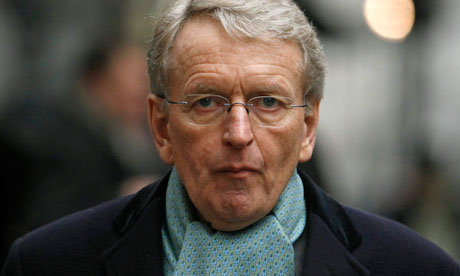Sir Christopher Meyer
denies Press Complaints Commission acted as a newspaper industry
'poodle'
 |
|
Sir
Christopher Meyer, former chairman of the PCC, at the
Leveson inquiry. Photograph: Andrew Winning/Reuters |
Sir Christopher Meyer, chairman of the Press Complaints Commission when
phone-hacking and other controversial newspaper practices being
scrutinised by Lord Justice Leveson were taking place, has defended his
record during a three-hour grilling marked by flashes of defiance and
quips about his success.
Meyer, a former UK ambassador to the US, denied the PCC had acted as a
newspaper industry "poodle" during his reign between 2003 and 2009, or
that he had been beholden to "overweening editors" such as the Daily
Mail's Paul Dacre.
He flatly rejected virtually every suggestion that the PCC had failed to
use its powers to investigate dubious and in some cases illegal
newspaper practices, such as the defamatory coverage and invasion of
privacy suffered by the parents of Madeleine McCann or phone hacking at
the News of the World.
Several times Meyer remonstrated with counsel for the inquiry, Robert
Jay QC, accusing him of putting words into his mouth and taking pot
shots at him like a "coconut" in a shy.
"Everything is painted as if we are an inert, inactive organisation,
sitting their slackly, mouths hanging open," he said.
Meyer was responding when it was put to him that he did not act on
evidence brought to him by the information commissioner in 2003 from
Operation Motorman, which suggested that a private investigator was
supplying illegally obtained information to newspapers.
Richard Thomas, the then information commissioner, had gone to the PCC
with evidence of hundreds of instances in which newspapers were
allegedly buying confidential information such as DVLA records from a
private detective, who subsequently pleaded guilty of illegally trading
in private data.
Meyer said Jay was trying to say that when "Richard Thomas turns up with
a dramatic story ... we still don't leap into action". He added: "On the
contrary we were extremely worried."
He described a handwritten note of a meeting with Thomas held at the
PCC's offices as indecipherable, "like interpreting the Rosetta stone",
and said that the information commissioner refused to give him the names
of newspapers involved or the journalists.
"Whenever I saw him, I said the same thing, 'where is the beef Mr
Thomas, give me the names, give me the newspapers', just [saying they
are] using inquiry agents isn't good enough," added Meyer.
He also refused to agree with Jay's repeated suggestions that the PCC
had failed to protect Gerry and Kate McCann from press intrusion and
libel.
Meyer said he felt very sorry for the "poor McCanns", adding they had
been subjected to "pretty violent" press reporting. But he said the PCC
made "exceptional efforts" to help them and had protected "their
children and family from being harassed by media scrums when they came
back to the UK".
This is in contrast to evidence given to the inquiry by the McCanns last
year, when they complained of a constant press presence outside their
house and harassment by photographers who would jump out of hedges to
get a snap of Kate McCann looking startled.
Meyer said he was angry that he found out Richard Desmond's Express
Newspapers was about to pay out £550,000 in a settlement to the McCanns
over defamatory coverage.
He revealed that he called the then editor of the Daily Express, Peter
Hill, and told him he had to resign from the PCC because of the coverage
of the McCanns.
Meyer was equally robust on phone hacking. He said the PCC's "decision
not to interview" the former News of the World editor Andy Coulson was
"the right one to take".
He said it was "improbable" that Coulson, who quit after the News of the
World's royal editor, Clive Goodman, and private investigator Glenn
Mulcaire were jailed for phone hacking offences in 2007, would have been
able to give the PCC more information than his successor Colin Myler.
On police corruption, he said the PCC was right not to implement a
recommendation by a parliamentary committee to make a ban on payments to
police by journalists explicit through a new clause in its code of
practice. He said he disagreed with the committee "because there was
already a draconian sanction in law".
Jay put it to him that the PCC had colluded with the press, to which
Meyer responded: "I think when you mention the word collusion, even to
dismiss it has the whiff of poodle or lapdog."
He said the claim that newspaper editors dictated what the PCC did was
equally preposterous.
Meyer added that the editors who sit on the commission were a
"completely disunited group" although he admitted there were "a few out
there" that sit like the "Bulgarian politburo".
However, he admitted that the balance was wrong between industry and lay
people on the other two arms of the self-regulatory system, because
newspapers "monopolised" Pressbof, the body that manages the PCC's
finances, and the code of practice committee.
On Max Mosley, he said had the former Formula One boss gone to the PCC
over the News of the World story, he would have told his director to
phone the paper to ask them if they were sure there was a public
interest defence. This may have stopped the paper from publishing the
story, he maintained.
On the future of press regulation Meyer said he was opposed to any form
of statutory reform because this would be the "slippery slope" for
interference by future governments.
In his written statement he said liberty and self regulation were
"inextricably linked" and "any infringement of self regulation would not
just erode the freedom of the press. Far more importantly it would
curtail the freedom of the citizen". |


